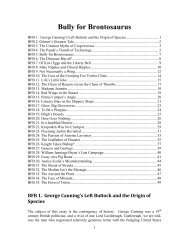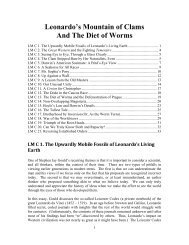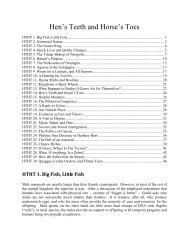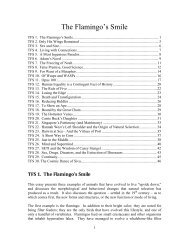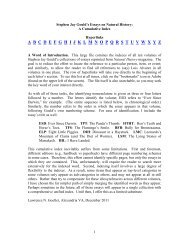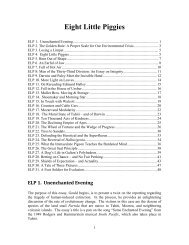goodness, and is both intelligent and well spoken. He is, however, frighteningly ugly.The creator, Dr. Frankenstein, reacts with horror and disgust, and forces the creature tolive as an outcast; it is this behavior, in the novel, that leads the monster to evil. Bothnature and nurture play a part here, Gould states: the lack of nurturing by VictorFrankenstein and everyone else, and the fundamental nature of the rest of us that areinherently repulsed by gross deformities (which we can overcome). However, hecautions, we should not fall into the trap of assigning percentages to these two factors; thefinal product is a result of a much more complicated interaction between the two.Gould also notes that the novel’s preface begins with a reference to “the thoughts of DrDarwin.” This is not Charles Darwin, who was less than ten years old at the time, butrather to his grandfather, Erasmus Darwin. Erasmus had argued that the physical“substance” of electricity, rather than a non-physical or spiritual force, might be theessence of what we call life. Shelly drew on this as the mechanism for bringing thecreature to life via a channeled lightening strike.DIH 6. The Tooth and Claw Centennial“Nature, red in tooth and claw” is a famous line from the also-famous (and very long)Victorian poem <strong>In</strong> Memoriam. Alfred, Lord Tennyson published it in 1850, someseventeen years after the death at age 22 of his dear friend Arthur Hallam. The phrase iswidely quoted by evolutionary biologists and other scientists in support of Darwin’stheory of evolution, although Origin of Species was not published until 1859. WhenTennyson died, the November 1893 edition of the widely read British journal TheNineteenth Century published a series of tributes to him. The very first one is by thefamous naturalist and Darwinian supporter, Thomas Henry Huxley. Gould takes thehundredth anniversary of Tennyson’s death and Huxley’s tribute as an opportunity toread the poem all the way through, and to offer his thoughts on the phrase, the poem, andthe man.Tennyson had studied science, among other things, at Trinity College at Cambridge, andmade a lifelong effort to keep up with it – something rather unusual for a poet. Many ofhis poems reflect his understanding and appreciation of the sciences. Many of the versesin <strong>In</strong> Memoriam are assumed today to represent his Darwinian view of biology (whichsome argued was “in the air” even before Darwin published), as well as Lyell’sgeological views on steady, uniform processes. This is not the case, Gould tells us, basedon his own reading and several professional books and reviews; he quotes extensivelyfrom the poem. Tennyson’s work actually reflects the incorrect but mainstream scientificviews of the day. Specifically, it reflects the view that natural history involved a series ofcreations, each with increasing excellence, mixed with periods of catastrophic extinction[see ELP 31]. The actual “tooth and claw” line is a reference to natural theology [HTHT2, ELP 9], another discarded paradigm. (Natural theology argues, in part, that since Godis good, all suffering in the world – including the loss of a loved one – must serve apurpose.) Some have read this poem as profoundly religious, others less so. Gould’sview is that the poem simply reflects the psychology of one man’s grieving over many6
years. Tennyson draws on science (among other things) for comfort, but in the end findsnone; Gould has argued elsewhere that there is none to find [see LMC 14].DIH 7. Sweetness and LightThe sixteenth and seventeenth centuries in Europe, which included the Renaissance andNewton, were an intellectual watershed in the West. Before this, the view was thatmodern people were inferior to their ancestors. During and after this period, the conceptof progress took root, and the culture came to reflect the view that moderns could reachieve,and perhaps even surpass, the wisdom and power of the Greeks and Romans.<strong>In</strong>dividuals and examples of this extended transition period have filled many of Gould’sessays. Here, he discusses some of the literary expressions and metaphors associatedwith the period as a whole.Gould uses two main source documents for this essay: On the Shoulders of Giants (1965)by sociologist of science Robert K. Merton, and the writings of a famous satirist of theperiod, Jonathan Swift. The title of Merton’s book is an example of how someintellectuals of the period (not just Newton, who is associated with the quote) approachedthe problem: “Yes, the ancients were giants; but at the same time, we do see farther thanthey do.” Merton credits Francis Bacon, a decided “modern” in the battle between whichgeneration was smarter, with “Bacon’s paradox,” although he does trace it backthousands of years. The paradox involves the concept of ancient, with the impliedproperty of wisdom. On the one hand, the Greeks and Romans were born long beforeBacon and us, so they are old while “we” are young. On the other hand, these ancestorsfunctioned when the world itself was younger; so actually the more ancient ones are thosewho were born later. Also in the mix is the argument that Aristotle (as an example) wasactually a young man when he made many of his key arguments. Gould offers noresolution to this paradox, and simply notes its use in the intellectual struggle betweenreverence for the wisdom of ancestors and the notion of progress.Bacon was a modernist; on the other side of the divide was Jonathan Swift, known todaylargely for Gulliver’s Travels. His works were primarily satire of the times in which helived, and are difficult to follow today because there are so many subtle references tospecific people and events of those times. <strong>In</strong> 1704, he wrote a satire that is known todayas “the battle of the books”; this refers to a war fantasy between books of “ancient” andmodern (that is, 17 th century) origin filed together on a library shelf. <strong>In</strong> the introductionto this work, Swift presents the famous (in literary circles) metaphor of the spider and thebee. The spider represents the moderns, and has constructed a mathematicallysophisticated but fragile web out of his own being. The bee, representing the ancients,does not create a web but rather flits about nature collecting nectar. The spider chargesthat the bee creates nothing, only forages among the ideas of others. [This may refer tocontemporary scholars of the ancients, rather than to the ancients themselves.] The beeretorts that the spider may indeed be producing original material, but much of it is toxicand most will end up as useless cobwebs. Further, the bee goes on, we fill our livingspaces with honey and wax, which give mankind the gifts of sweetness and light (thelatter via candles, and hence the essay’s title), as opposed to dead flies and excrement.7
- Page 4 and 5: cloud (“nebula”) of gas and dus
- Page 9: The second news story involves the
- Page 12 and 13: key ways. Prior to 1994, no fossil
- Page 14: DIH 11. Lucy on the Earth in Stasis
- Page 17: directly resulted in a mass extinct
- Page 20 and 21: Edgar Allan Poe, it turns out, wrot
- Page 22 and 23: things male, while the beautiful is
- Page 24 and 25: interest, until the entrepreneur of
- Page 26 and 27: essay is that scientists, for all t
- Page 28 and 29: DIH 23. The Smoking Gun of Eugenics
- Page 30 and 31: half-Jewish meant Jewish, while qua
- Page 32 and 33: Darwin’s theory, like Adam Smith
- Page 34 and 35: What might a better definition of t
- Page 36 and 37: type of soil, amount of rain, and s
- Page 38 and 39: Case Four, in Gould’s words, is
- Page 40 and 41: multiplying his findings by the num
- Page 42 and 43: other departments, something that r
- Page 44 and 45: Linnaeus, Gould states, did not sim
- Page 46: greatly prefers these metaphors, on



